On-demand content
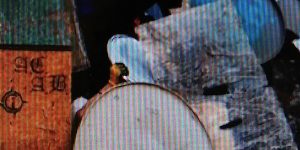
¿¿Women´s table??
The round table will be composed by women that are actively involved in Valdivia´s cultural production. Female artists, activists, academics and producers that will share views on the the current crisis, its latencies and consequences. The hinge of this conversation will be mutations and restrictions from a gender view, understanding that one of the mutations regards female participation within the cultural scenario.
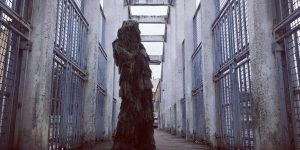
THE BAD WEEDS TRIPS
Rocio Berenguer (ES/FR)
Im Jahr 2030 führt uns ein Mensch-Pflanzen-Hybrid auf eine Reise durch die Vergangenheit und enthüllt die Ursprünge der G5, des ersten politischen Gipfeltreffens von Interspezies. Die Veranstaltung wurde von IOFLE initiiert, der Interspezies-Organisation für die Zukunft von Leben auf der Erde. Als Gründer werden der Künstler Rocío Berenguer und der IA-Mitarbeiter IAGOTCHI vermutet.
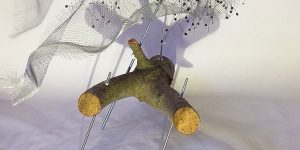
Mutations
The artistic proposal is presented as a curatorial articulation of multiple and heterogeneous work processes, but characterized by mutation. They are processes of works in mutation and on the mutation, like a seismograph of uncertainty. In their various formats, the works will be joined on the website of the UACh Réplica Gallery linked to the Ars Electronica Festival web platform.
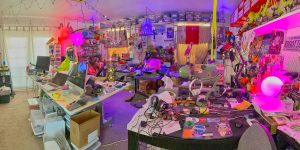
What Matters Now?
Sarah Petkus (US)
Im Zuge der globalen COVID-19-Pandemie wurde das tägliche Leben gestört, wodurch ihm Raum für Veränderungen gegeben wurde; vom Komfort der Routine bis hin zur Energie, die die Schaffung elektronischer und robotergestützter Arbeit antreibt.
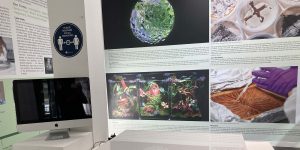
Identifying Successful STARTS Methodologies: Exhibition and Research Project
Pei-Ying Lin (TW), Giulia Tomasello (IT), Jen Keane (UK)
The exhibition presents the activities of the project, four of the eight case studies undertaken, and includes an installation of one of this years STARTS Prize 2020 Honorary Mention, Pei-Ying Lin’s Virophilia (2018-2020), an installation of Future Flora by designer Giulia Tomasello and winner of the STARTS Prize 2018 for Artistic Experimentation, alongside work from designer Jen Keane’s This is Grown project who received an Honorary Mention in 2019.
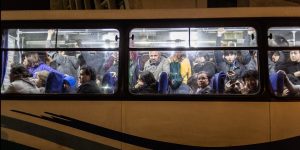
Mutations of the image. The revolt of photography
The first Valdivia International Festival of Photography, Directed by Carlos Fischer, was shaken by the revolt. The photographers changed their workshops on the streets. Lectures mutated. Images too. The abundant photographic material produced during those days in Valdivia, along with the video that reconstructs the convulsed days of the festival, make up an unexpected videogram of the revolt that can be viewed on the online platform of the Replica Gallery associated to UACh's Mutations project.
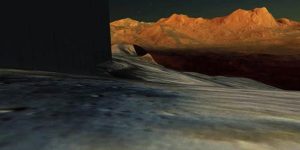
From Glass to Glass to Glass
Nye Thompson (UK)
Für meine neue Arbeit /artefact nahm ich ein großes Gebiet des Mars in Besitz, wobei ich Google Earth und Satellitenvermessungsdaten benutzte, um eine übergroße Grenzmauer um meinen Gebietsanspruch zu bauen. In diesem Video chatte ich mit der Kuratorin Lucy Dusgate, die das Werk ursprünglich in Auftrag gegeben hat, wobei unser keimneutrales, netzwerkgestütztes Gespräch über mein Marsterritorium übertragen wird.
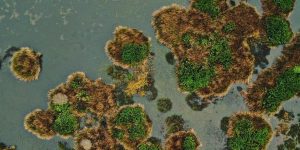
Ecosystem mutations. Wetland Removal.
An 8.5% of the surface area of Los Rios Region in southern Chile is made up of wetlands. Around the city of Valdivia, the presence of wetlands is particularly dense and some areas today are national monuments. A wetland is an ecosystem that is sometimes divided at the surface, but which constitutes a networked ecological continuum. Thus, to alter a part of the wetland is to modify the whole ecosystem. Promoting the convergence of different organizations, the Austral Garden program proposes an aerial route over the geography and natural environment where Universidad Austral de Chile is located. The purpose is that scientists and researchers can share their studies and reflections to spread the importance of wetlands, as well as showing the mutation of this natural eco-system.
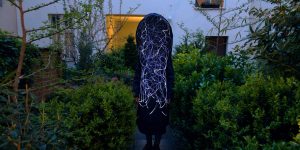
Artificial Intelligence and its False Lies
Mika Satomi (JP/AT)
In diesem Rundgang führt Sie Mika durch den Entstehungsprozess von Artificial Intelligence and its False Lies (dt.: Künstliche Intelligenz und ihre falschen Lügen), von den ersten Fragen, die sie hatte und wie eine zur nächsten führte, über die Befragung von Wissenschaftlern, bis hin zum eigenständigen Lernprozess zur Erstellung eines künstlichen neuronalen Netzwerks.

Leonardo S+T+ARTS: A conversation on "What's next? Art-Science ideas emerging from lockdown."
Camille Baker (CA/UK), Danielle Siembieda (US), Aurelie Delater (FR) and Marie Albert (FR)
During lockdown, Leonardo and STARTS collaborated to exchange and reflect, together with their wider communities, on how COVID-19 is impacting Art-Science/Art-Technology innovation and co-creation.

Beyond Human Perception
María Castellanos & Alberto Valverde (ES)
Die Arbeit ist eine Videoinstallation, die es dem Publikum ermöglicht, die Reaktionen von Menschen und Pflanzen auf einen gemeinsamen Stimulus zu visualisieren: Live-Musik. Die Installation ist das Ergebnis mehrerer Sitzungen, in denen die Gehirnaktivität von Menschen gemeinsam mit elektrischen Schwingungen in Pflanzen gemessen wurde, wobei ein von den Künstlern entwickelter Sensor verwendet wurde.
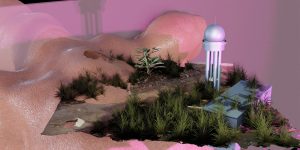
skip-the-line entrance
Daniel Hengst (DE)
In unvergesslichen visuellen Präsentationen erfahren Sie wie diese Künstler arbeiten und mit wem und was sie für nötig halten, um die alte Stadt zu verlassen und auf sumpfigem Boden eine neue zu bauen. Lassen Sie sich inspirieren und entdecken Sie bisher unsichtbare und nichtexistierende Attraktionen. Überspringen Sie die Warteschlange an diesem beliebten Ort.
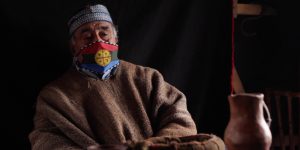
Local mutation imaginaries. Mapuche Culture Workshop.
As part of the celebration of the “Año Nuevo en el Sur” (Southern New Year), the Laboratory of Visual Anthropology of the Museological Direction, is conducting Workshops on Mapuche Culture taught by David Rain Canicura, peumatufe (the authority that guides the direction and decision-making of the community based on dreams) and nguillatufe (the authority responsible for the ceremony of Nguillatun). The proposal of the Mutations program is to generate a pre-recorded workshop that will allow the Mapuche imaginary about mutations to be better understood, as well as the experience of Mapuche communities in the current pandemic.
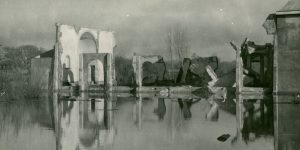
Telluric Mutations. The 1960 earthquake.
On May 22, 2020, 60 years since the largest seismic catastrophe ever recorded in the world was commemorated, a catastrophe whose epicenter was the city of Valdivia. The event had profound landscape, social, economic and cultural consequences for the affected cities and territories. The earthquake was a complex heritage where catastrophe and community resilience converge. The activity of the Austral Garden program is to share the series of initiatives prepared by the Museological Direction of Universidad Austral de Chile.
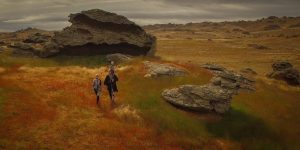
WAHAWAEWAO
Gibson / Martelli (UK), Carol Brown (NZ) and Russell Scoones (NZ)
Movement and landscape in flux, five figures wander across the landscape of Central Otago. Between the rocks and crevices, they move. In this moving image installation, we explore our persistent longing for belonging in an age of virtual travel. Filmed in the raw physical landscapes of Central Otago and the Motion Capture Studio of CoLab AUT in Auckland, we map between radically different scapes.

The Crying Book with Heather Christle and Performance by Gary Motley
Heather Christle, Gary Motley
The Crying Book is a deeply personal tribute to the fascinating strangeness of tears and the unexpected resilience of joy. Why do we cry? How do we cry? Heather Christle has just lost a dear friend to suicide and now must reckon with her own depression and the birth of her first child. As she faces her grief and impending parenthood, she decides to research the act of crying: what it is and why people do it. She researches tear-collecting devices and explores the role white women’s tears play in racist violence. Motley performs Someday Sunday as Christle reads from her first book of nonfiction, The Crying Book.
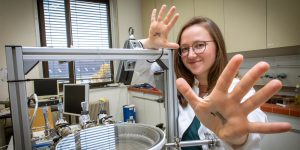
Reparatur der Zukunft
Ö1
Mit der Initiative *Reparatur der Zukunft* will Ö1 die Fragen der 20- bis 30-Jährigen aufgreifen und ihren Ideen mehr Raum geben. Ars Electronica präsentiert zwei Projekte zu diesem Thema

Pandemic-Pandemonium! Curated by Kennii Ekundayo
Galeri ODUMIJE, Lagos (NG)
Pandemic-Pandemonium! is a two-part presentation centered on the collective response of Africans living in Africa vis-à-vis current prevalent issues that threaten humankind — racial discrimination, violence against women and the COVID-19 pandemic. Whilst one part makes a statement on the resilience of the human spirit in the face of the deadly coronavirus, the other focuses on the valorization of melanin-rich skin amidst the fatal hostility that accompanies it.
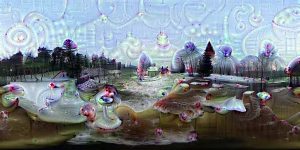
Keynote: Exploring Potentials and Risks of AI Technology from a Perspective of Creatives
Varvara Guljajeva (EE)
In the beginning of AI technology development in the late 50s, the field did not reach set goals because the machines were not smart and fast enough. Today, when it is spoken about the third wave of AI and quantum computing, the dream is very close to come true – reaching the human-level of intelligence. However, what kind of consequences could bring these technological achievements?
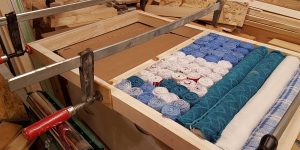
Master Class Audio Design Goes Interactive
Master Class Audio Design @ St. Pölten University of Applied Sciences (AT)
Die Masterklasse Audiodesign des Studiengangs Digital Media Production ermöglicht es, die große Bandbreite des Audiodesigns zu erfahren. Dies geschieht durch Fokussierung auf vier Projekte, die von jeder Student*in über die vier Semester eigenverantwortlich konzipiert, entwickelt, geplant, umgesetzt und evaluiert werden. Aus den diesjährigen Semesterprojekten wurden drei ausgewählt, die im Rahmen des Ars Electronica Festivals präsentiert werden.


